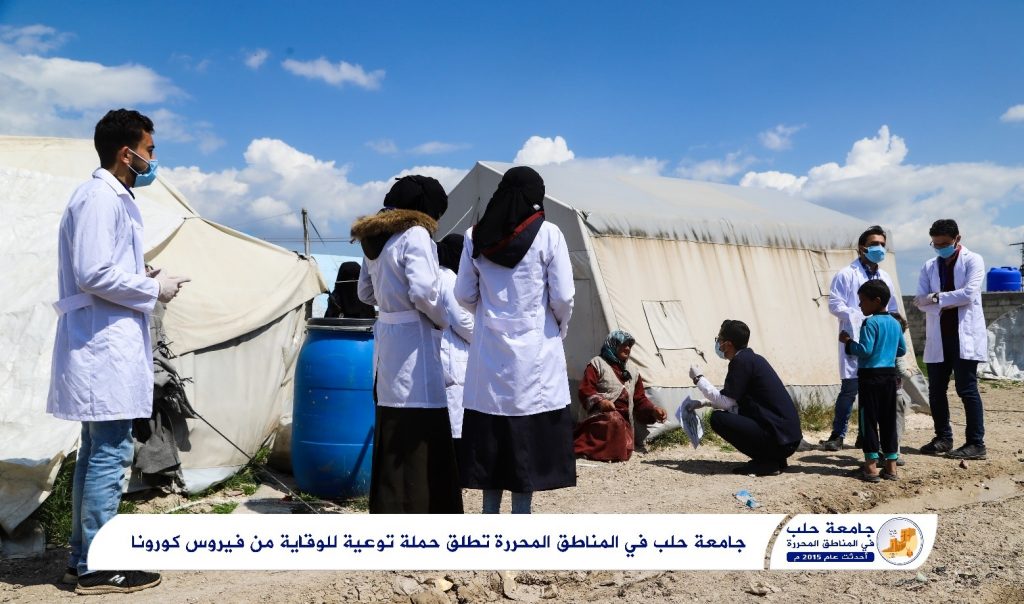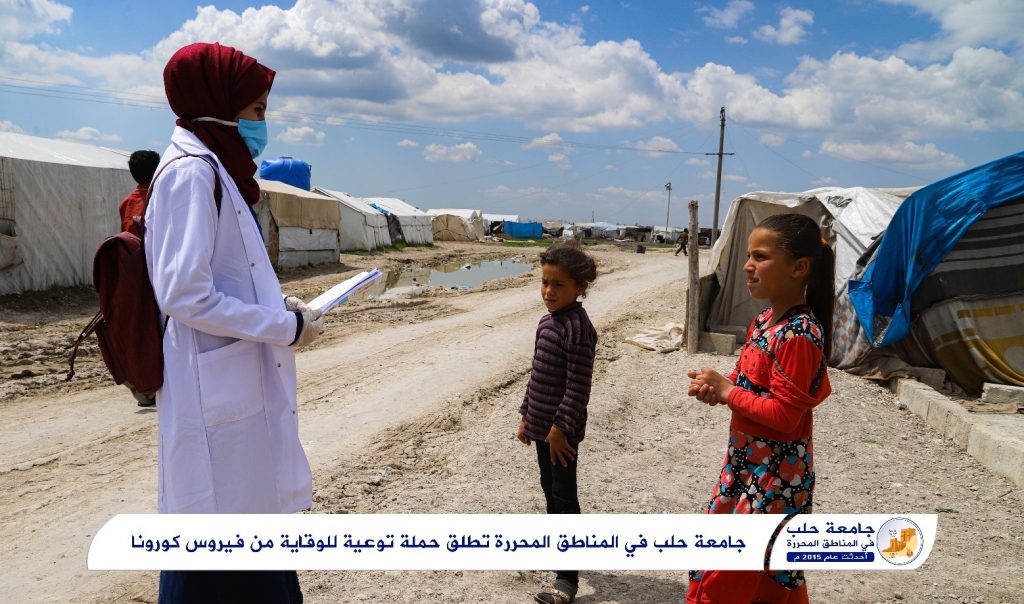In the liberated areas, the University of Aleppo organized, through the Faculties of Medicine and Pharmacy, a medical campaign by students and specialists to educate civilians and camp residents in the liberated areas, in order to prevent the threat of the new Corona virus, its spread in the world, and ways to prevent it, with the aim of preventing the occurrence of the epidemic or reducing the size of the epidemic. Injuries if they happen.
The campaign, which was launched a month ago, includes three phases, starting with preparing and training students, then distributing them to the camps and spreading awareness about the Corona virus, and finally training on how to treat patients in the event of a pandemic and taking the necessary measures.
Speaking about the details of the campaign, Dr. Jawad Abu Hatab, Dean of the College of Medicine and Pharmacy at the university, stated that the first phase consisted of five training courses targeting 300 students from the College of Medicine and 60 students from pharmacy, in coordination with SEMA and Violet in The city of Marea, the Family Association in the city of Afrin, the Academy of Emergency Medicine, and finally the city of Atmeh in the countryside of Idlib in coordination with the HAIDYLENA organization
Dr. Jawad explained that the focus of the training was about the emerging corona virus and introducing it as a pandemic, in addition to training students on the necessary skills in educating target groups and factors to prevent the epidemic and informing people of them.
As for the acquired skills, the student Mudar Abdul Latif Omar, who is in the fifth year at the Faculty of Human Medicine, confirmed that, through training, the trainees were able to obtain complete information about the virus, and refine their knowledge of the available diagnostic methods that most countries follow, in addition to the methods of dealing with a Corona infected person. .
After the training in the first phase was completed, the second phase of the campaign began by dividing the students into teams distributed over 28 camps in Marea, Azaz, Afrin, Janders, Ihtimalat and al-Bab in the northern countryside of Aleppo, and Idlib, Keli, Dana, Sarmada and Khirbet al-Jouz in Idlib countryside.
The work of the teams, according to Dr. Jawad, focused on collecting questionnaires through thirty questions asked to the targets, in addition to publishing awareness brochures and distributing them to them, while guiding them on the right ways to prevent the Corona virus and the correct procedures in the event of any suspected case.
The second phase, which included eight thousand and eight families, equivalent to forty thousand citizens, ended with sufficient information about the Corona virus and its danger to society.

The biggest challenge during the campaign, according to the students participating in it, is that most of the people inside who live in tents do not find their livelihood if they stick to their tents, and therefore they cannot stay in their tents looking at a hungry boy or a lack of water and life necessities, in addition to that there is no infrastructure to help Follow full precautions.
As for the procedures followed in the event of an epidemic, Dr. Jawad explained that in the third phase of the campaign, which began a few days ago and continues until now, students are trained on how to deal with patients and the method of taking a swab from the pharynx in order to rehabilitate them and distribute them to hospitals in the event of a pandemic due to Due to the severe shortage of medical personnel in the liberated areas regarding the Corona virus.
And the Corona virus, or what is known as “COVID19”, is a non-living body that parasitizes the lung. It first appeared in 2012 and the main cause of it was the bat, then it moved to the ant eater and then to the human being. Their immunity decreases due to old age or diabetes and heart patients, its danger lies in its rapid spread, and the body can transmit the infection up to fourteen days before any symptoms appear on it.
It is noteworthy that the University of Aleppo in the liberated areas was one of the first institutions that took the necessary measures to prevent the Corona virus, and suspended working hours in all its faculties by a decision of the university presidency in coordination with the Ministry of Higher Education in the Syrian Interim Government, and it followed the method of distance education temporarily.
This comes within the framework of joint efforts regionally and internationally, and after the World Health Organization announced that the new Corona virus, which is still spreading in various parts of the world, has become a “global epidemic,” stressing at the same time that it is still possible to control it.
In the liberated areas, the University of Aleppo organized, through the Faculties of Medicine and Pharmacy, a medical campaign by students and specialists to educate civilians and camp residents in the liberated areas, in order to prevent the threat of the new Corona virus, its spread in the world, and ways to prevent it, with the aim of preventing the occurrence of the epidemic or reducing the size of the epidemic. Injuries if they happen.
The campaign, which was launched a month ago, includes three phases, starting with preparing and training students, then distributing them to the camps and spreading awareness about the Corona virus, and finally training on how to treat patients in the event of a pandemic and taking the necessary measures

Speaking about the details of the campaign, Dr. Jawad Abu Hatab, Dean of the College of Medicine and Pharmacy at the university, stated that the first phase consisted of five training courses targeting 300 students from the College of Medicine and 60 students from pharmacy, in coordination with SEMA and Violet in The city of Marea, the Family Association in the city of Afrin, the Academy of Emergency Medicine, and finally the city of Atmeh in the countryside of Idlib in coordination with the HAIDYLENA organization
Dr. Jawad explained that the focus of the training was about the emerging corona virus and introducing it as a pandemic, in addition to training students on the necessary skills in educating target groups and factors to prevent the epidemic and informing people of them.
As for the acquired skills, the student Mudar Abdul Latif Omar, who is in the fifth year at the Faculty of Human Medicine, confirmed that, through training, the trainees were able to obtain complete information about the virus, and refine their knowledge of the available diagnostic methods that most countries follow, in addition to the methods of dealing with a Corona infected person. .
After the training in the first phase was completed, the second phase of the campaign began by dividing the students into teams distributed over 28 camps in Marea, Azaz, Afrin, Janders, Ihtimalat and al-Bab in the northern countryside of Aleppo, and Idlib, Keli, Dana, Sarmada and Khirbet al-Jouz in Idlib countryside.
The work of the teams, according to Dr. Jawad, focused on collecting questionnaires through thirty questions asked to the targets, in addition to publishing awareness brochures and distributing them to them, while guiding them on the right ways to prevent the Corona virus and the correct procedures in the event of any suspected case.
The second phase, which included eight thousand and eight families, equivalent to forty thousand citizens, ended with sufficient information about the Corona virus and its danger to society.
The biggest challenge during the campaign, according to the students participating in it, is that most of the people inside who live in tents do not find their livelihood if they stick to their tents, and therefore they cannot stay in their tents looking at a hungry boy or a lack of water and life necessities, in addition to that there is no infrastructure to help Follow full precautions.
As for the procedures followed in the event of an epidemic, Dr. Jawad explained that in the third phase of the campaign, which began a few days ago and continues until now, students are trained on how to deal with patients and the method of taking a swab from the pharynx in order to rehabilitate them and distribute them to hospitals in the event of a pandemic due to Due to the severe shortage of medical personnel in the liberated areas regarding the Corona virus.
And the Corona virus, or what is known as “COVID19”, is a non-living body that parasitizes the lung. It first appeared in 2012 and the main cause of it was the bat, then it moved to the ant eater and then to the human being. Their immunity decreases due to old age or diabetes and heart patients, its danger lies in its rapid spread, and the body can transmit the infection up to fourteen days before any symptoms appear on it.
It is noteworthy that the University of Aleppo in the liberated areas was one of the first institutions that took the necessary measures to prevent the Corona virus, and suspended working hours in all its faculties by a decision of the university presidency in coordination with the Ministry of Higher Education in the Syrian Interim Government, and it followed the method of distance education temporarily.
This comes within the framework of joint efforts regionally and internationally, and after the World Health Organization announced that the new Corona virus, which is still spreading in various parts of the world, has become a “global epidemic,” stressing at the same time that it is still possible to control it.
